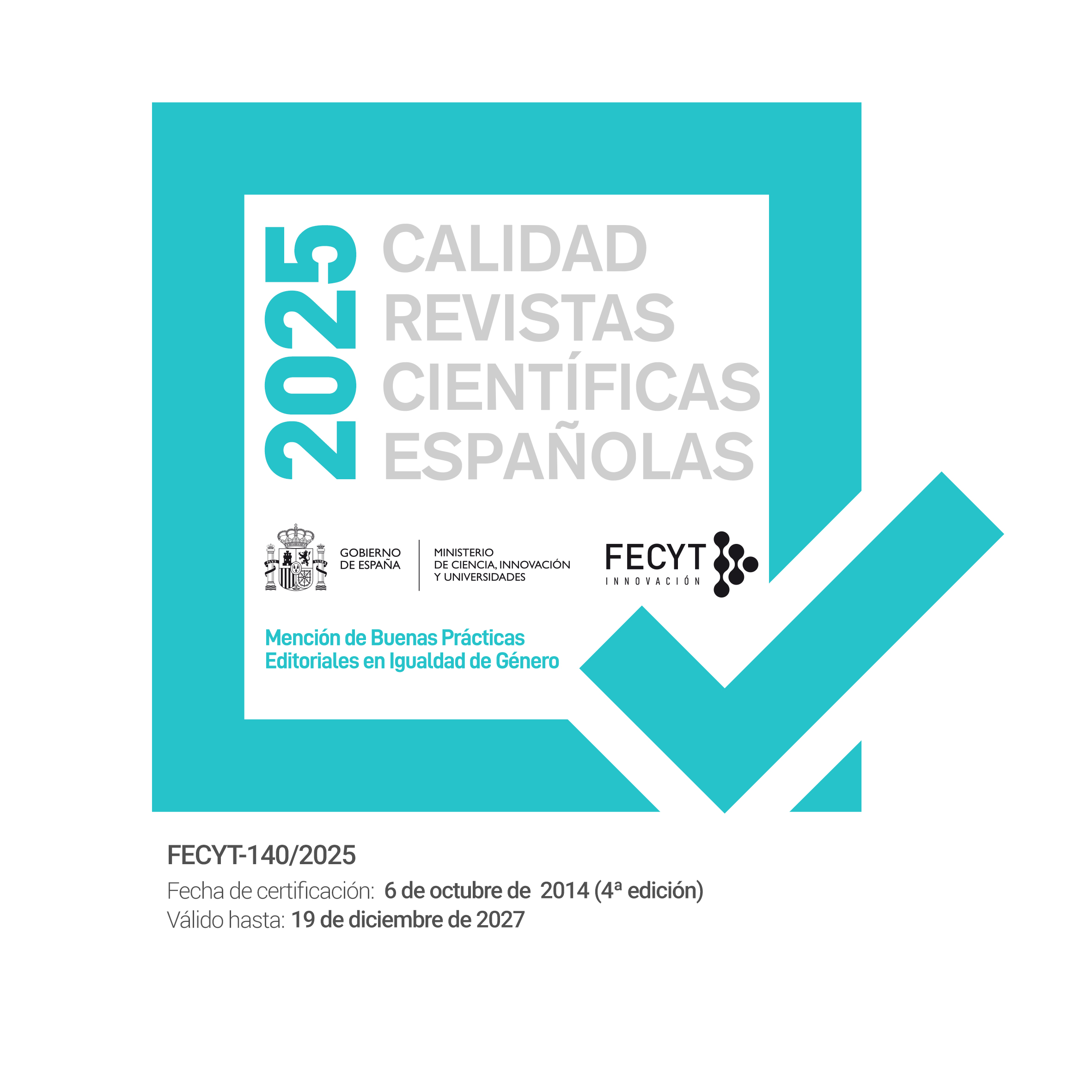Evaluación de la orientación emprendedora y su relación con el género y el rendimiento académico
DOI:
https://doi.org/10.5944/educxx1.32994Palabras clave:
orientación emprendedora, emprendimiento, adaptación de test, género, rendimiento académico, Formación ProfesionalResumen
La orientación emprendedora es un concepto clave en el contexto organizacional que está adquiriendo una relevancia cada vez mayor en el ámbito educativo, ya que la promoción del emprendimiento se ha convertido en una de las líneas de acción más importantes de la Unión Europea en materia de educación. Dado que la Escala de Orientación Emprendedora (EOE) es uno de los pocos instrumentos que permiten evaluar la orientación emprendedora en estudiantes, el primer objetivo del presente estudio consistió en la adaptación al euskera y la validación de la EOE (EOE-E). El segundo objetivo fue examinar la relación de la orientación emprendedora con el género y con el rendimiento académico. La muestra estuvo compuesta por 735 estudiantes de Formación Profesional. En cuanto al primer objetivo, el Análisis Factorial Confirmatorio corroboró la estructura de seis factores del cuestionario original, presentando índices aceptables de consistencia interna y estabilidad temporal. Se recabaron evidencias de validez convergente y de relación con otras variables, tales como la autoeficacia y la iniciativa personal. Por lo tanto, cabe afirmar que se obtuvieron evidencias de validez y fiabilidad de la EOE-E para la evaluación de la orientación emprendedora en estudiantes de Formación Profesional. En lo que respecta al segundo objetivo, los varones presentaron puntuaciones medias superiores a las de las mujeres en orientación competitiva, mientras que las mujeres superaron a los varones en orientación al aprendizaje. Además, en comparación con el estudiantado de menor rendimiento académico, los y las estudiantes con mejores calificaciones académicas mostraron una mayor orientación a la innovación, orientación proactiva, orientación al logro y orientación al aprendizaje.
Descargas
Citas
Al Issa, H., Abdelsalam, M. K., & Omar, M. M. S. (2019). The effect of entrepreneurial self-efficacy on persistence: Do financial literacy and entrepreneurial passion matter? Polish Journal of Management Studies, 20(2), 60–72. https://doi.org/10.17512/pjms.2019.20.2.05
Arham, A. F., Norizan, N. S., Muslim, N. H., & Aksan, A. (2020). Effects of gender on leadership, entrepreneurial orientation and organisational performance. Social and Management Research Journal, 17(1), 49–60. https://doi.org/10.24191/smrj.v17i1.8142
Athayde, R. (2009). Measuring enterprise potential in young people. Entrepreneurship Theory and Practice, 33(2), 481–500. https://doi.org/10.1111/j.1540-6520.2009.00300.x
Bacigalupo, M., Kampylis, P., Punie, Y., & Van den Brande, G. (2016). EntreComp: The entrepreneurship competence framework (Informe nº EUR 27939 EN). Publications Office of the European Union. https://doi.org/10.2791/593884
Baessler, J., & Schwarzer, R. (1996). Evaluación de la autoeficacia: Adaptación española de la Escala de Autoeficacia General. Ansiedad y Estrés, 2(1), 1–8.
Balluerka, N., Gorostiaga, A., & Ulacia, I. (2014). Assessing personal initiative among vocational training students: Development and validation of a new measure. The Spanish Journal of Psychology, 17, Artículo E83, 1–9. https://doi.org/10.1017/sjp.2014.80
Bandura, A. (1977). Self-efficacy: Toward a unifying theory of behavioral change. Advances in Behaviour Research and Therapy, 1(4), 139–161. https://doi.org/10.1016/0146-6402(78)90002-4
Bernal-Guerrero, A., & Cárdenas-Gutiérrez, A. R. (2017). Evaluación del potencial emprendedor en escolares: Una investigación longitudinal. Educación XX1, 20(2), 73–94, https://doi.org/10.5944/educxx1.19032
Bernal-Guerrero, A., Cárdenas-Gutiérrez, A. R., & Athayde, R. (2021). Test de Potencial Emprendedor: Adaptación al español (ATE-S). Bordón: Revista de Pedagogía, 73(1), 19–37. https://doi.org/10.13042/Bordon.2021.71417
Bilić, I., Prka, A., & Vicović, G. (2011). How does education influence entrepreneurship orientation? Case study of Croatia. Management: Journal of Contemporary Management Issues, 16(1), 115–128. https://hrcak.srce.hr/69394
Boada-Grau, J., Sánchez-García, J. C., Viardot, E., Boada-Cuerva, M., & Vigil-Colet, A. (2016). Entrepreneurial Orientation Scale: Adaptation to Spanish. The Spanish Journal of Psychology, 19, Artículo e47. https://doi.org/10.1017/sjp.2016.19
Bolton, D. L., & Lane, M. D. (2012). Individual entrepreneurial orientation: Development of a measurement instrument. Education + Training, 54(2/3), 219–233. https://doi.org/10.1108/00400911211210314
Chen, C. C., Greene, P. G., & Crick, A. (1998). Does entrepreneurial self-efficacy distinguish entrepreneurs from managers? Journal of Business Venturing, 13(4), 295–316. https://doi.org/10.1016/S0883-9026(97)00029-3
Covin, J. G., & Slevin, D. P. (1989). Strategic management of small firms in hostile and benign environments. Strategic Management Journal, 10(1), 75–87. https://doi.org/10.1002/smj.4250100107
Crespo, N. F., Belchior, R., & Costa, E. B. (2020). Exploring individual differences in the relationship between entrepreneurial self-efficacy and intentions: Evidence from Angola. Journal of Small Business and Enterprise Development, 27(1), 1–30. https://doi.org/10.1108/JSBED-03-2017-0105
Eniola, A. A. (2020). Entrepreneurial self-efficacy and orientation for SME development. Small Enterprise Research, 27(2), 125–145. https://doi.org/10.1080/13215906.2020.1752295
European Commission (2019). Key competences for lifelong learning. Publications Office of the European Union. https://doi.org/10.2766/569540
Fayolle, A., & Gailly, B. (2015). The impact of entrepreneurship education on entrepreneurial attitudes and intention: Hysteresis and persistence. Journal of Small Business Management, 53(1), 75–93. https://doi.org/10.1111/jsbm.12065
Frese, M., & Fay, D. (2001). Personal initiative: An active performance concept for work in the 21st century. Research in Organizational Behavior, 23, 133–187. https://doi.org/10.1016/S0191-3085(01)23005-6
Frese, M., Kring, W., Soose, A., & Zempel, J. (1996). Personal initiative at work: Differences between East and West Germany. Academy of Management Journal, 39(1), 37–63.
Gobierno Vasco (2019). VI Encuesta Sociolingüística. Servicio Central de Publicaciones del Gobierno Vasco. https://cutt.ly/x830mZK
Gorostiaga, A., Aliri, J., Ulacia, I., Soroa, G., Balluerka, N., Aritzeta, A., & Muela, A. (2019). Assessment of entrepreneurial orientation in vocational training students: Development of a new scale and relationships with self-efficacy and personal initiative. Frontiers in Psychology, 10, Artículo 1125. https://doi.org/10.3389/fpsyg.2019.01125
Gorostiaga, A., Balluerka, N., Ulacia, I., & Aliri, J. (2018). Evaluación de la iniciativa personal en el ámbito educativo y su relación con la actitud emprendedora y el rendimiento académico. Revista Iberoamericana de Diagnóstico y Evaluación Psicológica – e Avaliação Psicológica, 48(3), 105–116. https://doi.org/10.21865/RIDEP48.3.09
Hernández, A., Hidalgo, M. D., Hambleton, R. K., & Gómez-Benito, J. (2020). International Test Commission guidelines for test adaptation: A criterion checklist. Psicothema, 32(3), 390–398. https://doi.org/10.7334/psicothema2019.306
Hu, L. T., & Bentler, P. M. (1999). Cutoff criteria for fit indexes in covariance structure analysis: Conventional criteria versus new alternatives. Structural Equation Modeling: A Multidisciplinary Journal, 6(1), 1–55. https://doi.org/10.1080/10705519909540118
Hunt, K. A. (2016). Individual entrepreneurial orientation, gender, and involvement in entrepreneurial activities: A study of faculty at Pennsylvania’s public universities [Tesis doctoral, Grand Canyon University]. ProQuest Dissertations and Theses Global. https://cutt.ly/F830FRp
Kee, D. M. H., & Rahman, N. A. (2018). Does technopreneurs’ entrepreneurial orientation matter on start-up success? The role of gender. The European Proceedings of Social and Behavioural Sciences, 40, 568–576. https://doi.org/10.15405/epsbs.2018.05.45
Koop, S., de Reu, T., & Frese, M. (2000). Sociodemographic factors, entrepreneurial orientation, personal initiative, and environmental problems in Uganda. En M. Frese (Ed.), Success and failure of microbusiness owners in Africa: A psychological approach (pp. 55–76). Quorum Books.
Krauss, S. I., Frese, M., Friedrich, C., & Unger, J. M. (2005). Entrepreneurial orientation: A psychological model of success among southern African small business owners. European Journal of Work and Organizational Psychology, 14(3), 315–344. https://doi.org/10.1080/13594320500170227
Kumar, S., Paray, Z. A., & Dwivedi, A. K. (2021). Student’s entrepreneurial orientation and intentions: A study across gender, academic background, and regions. Higher Education, Skills and Work-Based Learning, 11(1), 78–91. https://doi.org/10.1108/HESWBL-01-2019-0009
Kurniawan, J. E., Setiawan, J. L., Sanjaya, E. L., Wardhani, F. P. I., Virlia, S., Dewi, K., & Kasim, A. (2019). Developing a measurement instrument for high school students’ entrepreneurial orientation. Cogent Education, 6(1), Artículo 1564423. https://doi.org/10.1080/2331186X.2018.1564423
Lee, S. M., Lim, S., & Pathak, R. D. (2011). Culture and entrepreneurial orientation: A multi-country study. International Entrepreneurship and Management Journal, 7(1), 1–15. https://doi.org/10.1007/s11365-009-0117-4
Lim, S., & Envick, B. R. (2013). Gender and entrepreneurial orientation: A multi-country study. International Entrepreneurship and Management Journal, 9, 465–482. https://doi.org/10.1007/s11365-011-0183-2
Lumpkin, G. T., & Dess, G. G. (1996). Clarifying the entrepreneurial orientation construct and linking it to performance. Academy of Management Review, 21(1), 135–172. https://doi.org/10.2307/258632
Marques, C., Santos, G., Galvão, A., Mascarenhas, C., & Justino, E. (2018). Entrepreneurship education, gender and family background as antecedents on the entrepreneurial orientation of university students. International Journal of Innovation Science, 10(1), 58–70. https://doi.org/10.1108/IJIS-07-2017-0067
Miller, D. (1983). The correlates of entrepreneurship in three types of firms. Management Science, 29(7), 770–791. https://doi.org/10.1287/mnsc.29.7.770
Mintzberg, H. (1973). Strategy-making in three modes. California Management Review, 16(2), 44–53. https://doi.org/10.2307/41164491
Mohd, R., Kamaruddin, B. H., Hassan, S., Muda, M., & Yahya, K. R. (2014). The important role of self-efficacy in determining entrepreneurial orientations of Malay small scale entrepreneurs in Malaysia. International Journal of Management Studies, 20(1), 61–82. https://cutt.ly/T8540F2
Mutlutürk, M., & Mardikyan, S. (2018). Analysing factors affecting the individual entrepreneurial orientation of university students. Journal of Entrepreneurship Education, 21(1S), 1–15. https://cutt.ly/l8302nV
Nsereko, I., Balunywa, W., Munene, J., Orobia, L., & Muhammed, N. (2018). Personal initiative: Its power in social entrepreneurial venture creation. Cogent Business and Management, 5, Artículo 1443686. https://doi.org/10.1080/23311975.2018.1443686
Ogunleye, A. J., & Osagu, J. C. (2014). Self-efficacy, tolerance for ambiguity and need for achievement as predictors of entrepreneurial orientation among entrepreneurs in Ekiti State, Nigeria. European Journal of Business and Management, 6(17), 240–250. https://cutt.ly/D854zsI
Otache, I., Edopkolor, J. E., & Kadiri, U. (2022). A serial mediation model of the relationship between entrepreneurial education, orientation, motivation and intentions. The International Journal of Management Education, 20(2), Artículo 100645. https://doi.org/10.1016/j.ijme.2022.100645
Pérez, J. P., Martins, I., Mahauad, M. D., & Sarango-Lalangui, P. O. (2022). A bridge between entrepreneurship education, program inspiration, and entrepreneurial intention: The role of individual entrepreneurial orientation. Evidence from Latin American emerging economies. Journal of Entrepreneurship in Emerging Economies. Publicación anticipada en línea. https://doi.org/10.1108/JEEE-04-2021-0137
Phelan, E., Johnson A., & Semrau, T. (2013). Entrepreneurial orientation in public schools: The view from New Jersey. New England Journal of Entrepreneurship, 16(1), 19–30. https://doi.org/10.1108/NEJE-16-01-2013-B002
Ramesh, N., Sagar, M. P., Yadav, R., Pathade, S. S., & Pordhiya, K. I. (2018). Correlation between socio-personal variables and entrepreneurial orientation among Agriculture and Animal Sciences undergraduates. International Journal of Current Microbiology and Applied Sciences, 7(1), 3180–3185. https://doi.org/10.20546/ijcmas.2018.701.379
Reyes, L. E., Pinillos, M. J., & Soriano, I. (2014). Gender differences in entrepreneurial orientation. ESIC Market, 45(3), 421–439.
Rivai, H. A., Negara, C. K., & Lukito, H. (2018). The entrepreneurial traits as moderating variable in the relationship between academic performance and entrepreneurial orientation of university students: A study in Indonesia higher education context. Indian Journal of Public Health Research & Development, 9(12), 2604–2609.
Roth, E., & Lacoa, D. (2009). Análisis psicológico de la conducta emprendedora en estudiantes universitarios: Medición, relaciones y predicción. Ajayu, 7(1), 1–38. https://cutt.ly/Q832iij
Sanjuán, P., Pérez, A. M., & Bermúdez, J. (2000). Escala de autoeficacia general: Datos psicométricos de la adaptación para población española. Psicothema, 12(Supl. 2), 509–513. https://cutt.ly/3832tb1
Sulphey, M. M., & Salim, A. (2021). Development of a tool to measure social entrepreneurial orientation. Journal of Entrepreneurship in Emerging Economies, 13(2), 231–253. https://doi.org/10.1108/JEEE-07-2019-0099

Descargas
Publicado
Cómo citar
Número
Sección
Licencia
Derechos de autor 2023 Arantxa Gorostiaga, Jone Aliri , Nekane Balluerka , Joanes Lameirinhas

Esta obra está bajo una licencia internacional Creative Commons Atribución-NoComercial 4.0.
La revista Educación XX1 se publica bajo licencia Creative Commons Reconocimiento-NoComerciaL 4.0 (CC BY-NC 4.0). Se permite la generación de obras derivadas siempre que no se haga un uso comercial. Tampoco se puede utilizar la obra original con finalidades comerciales.










